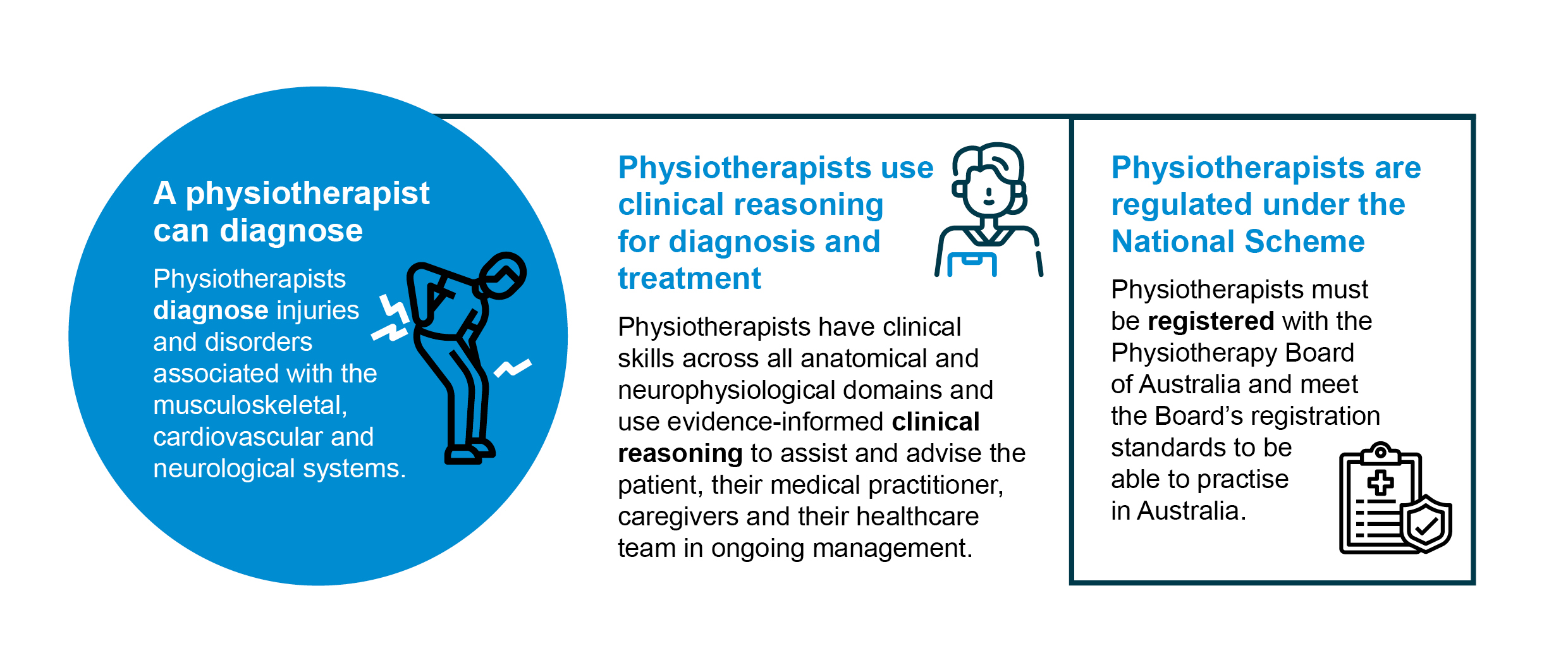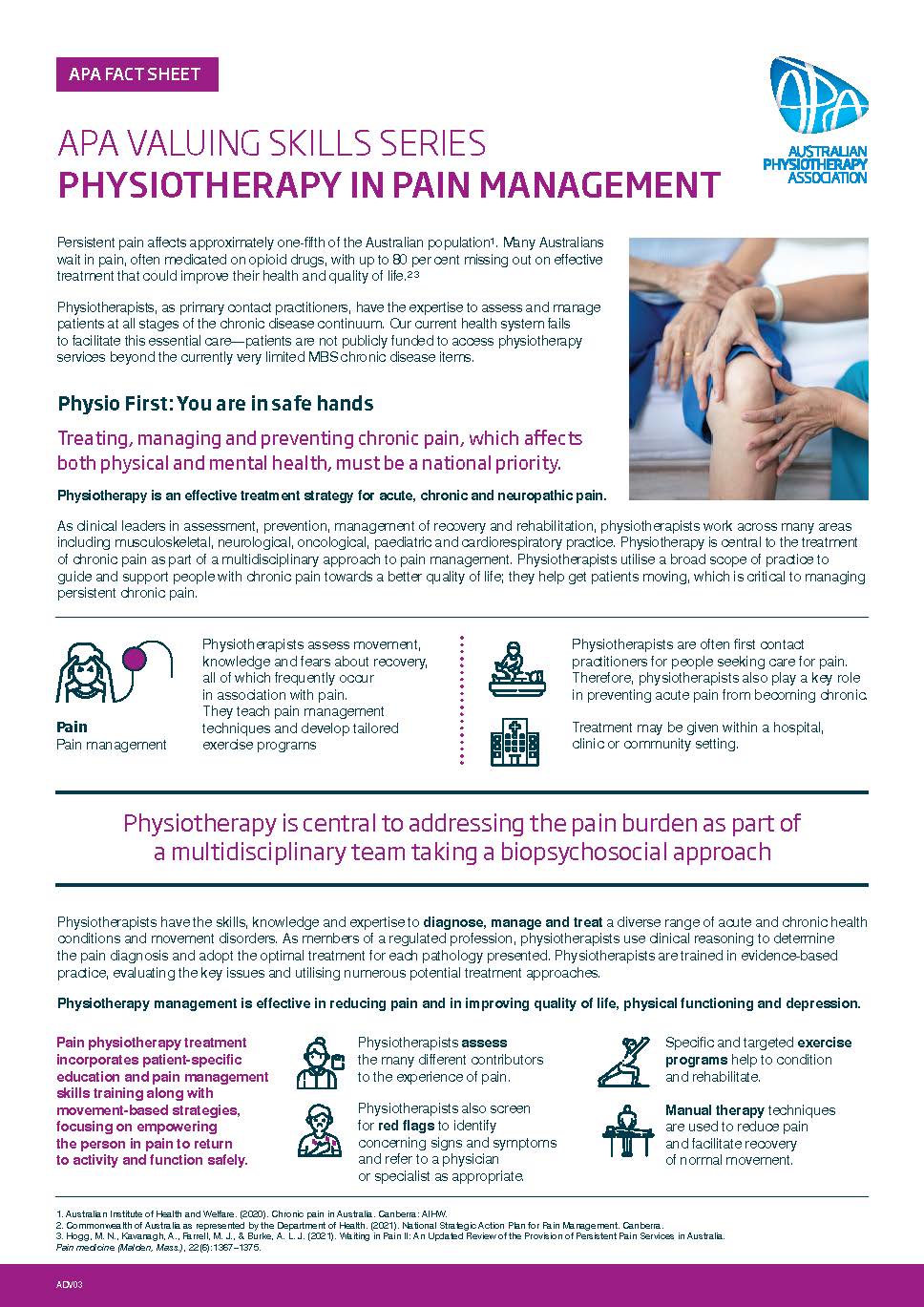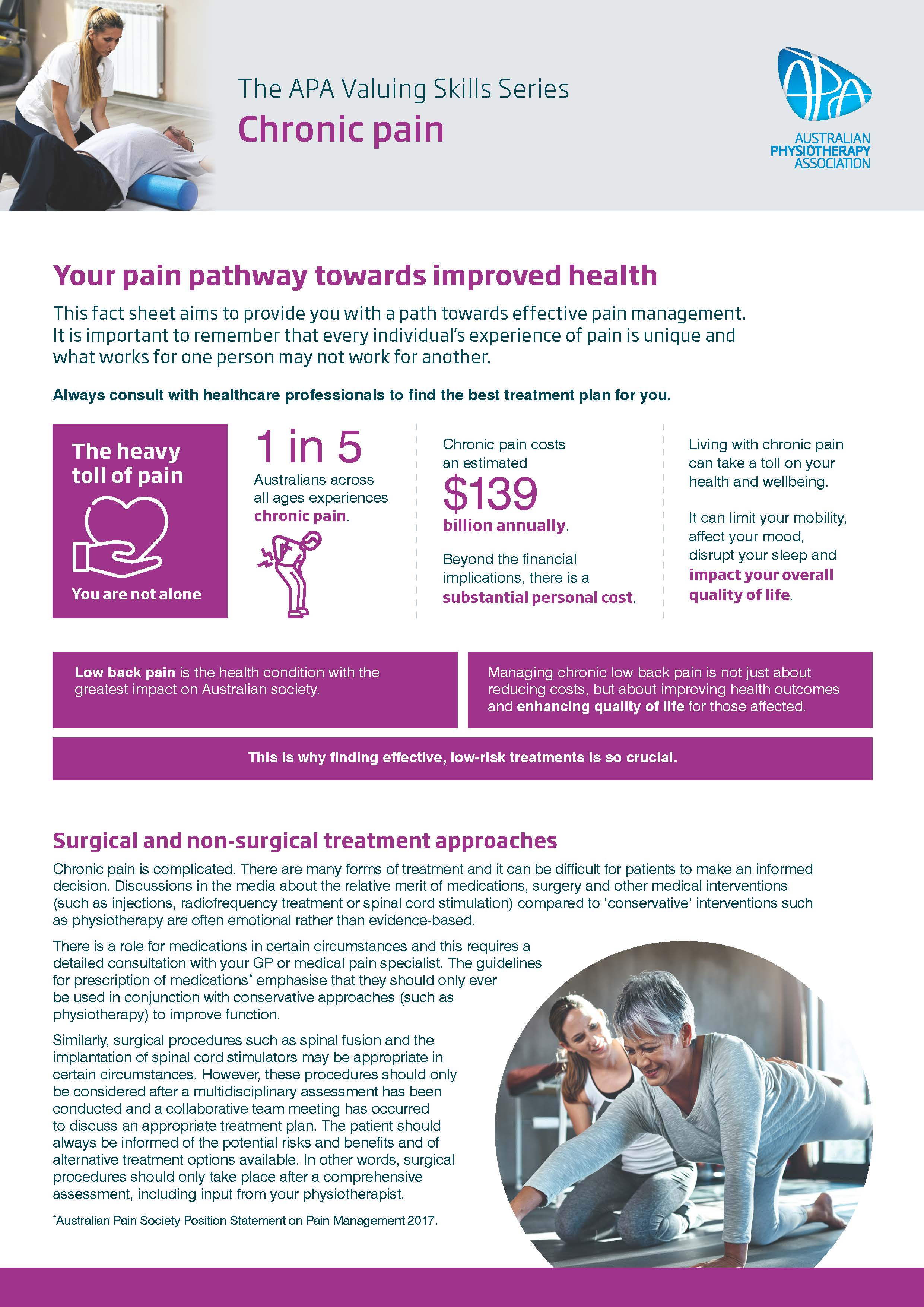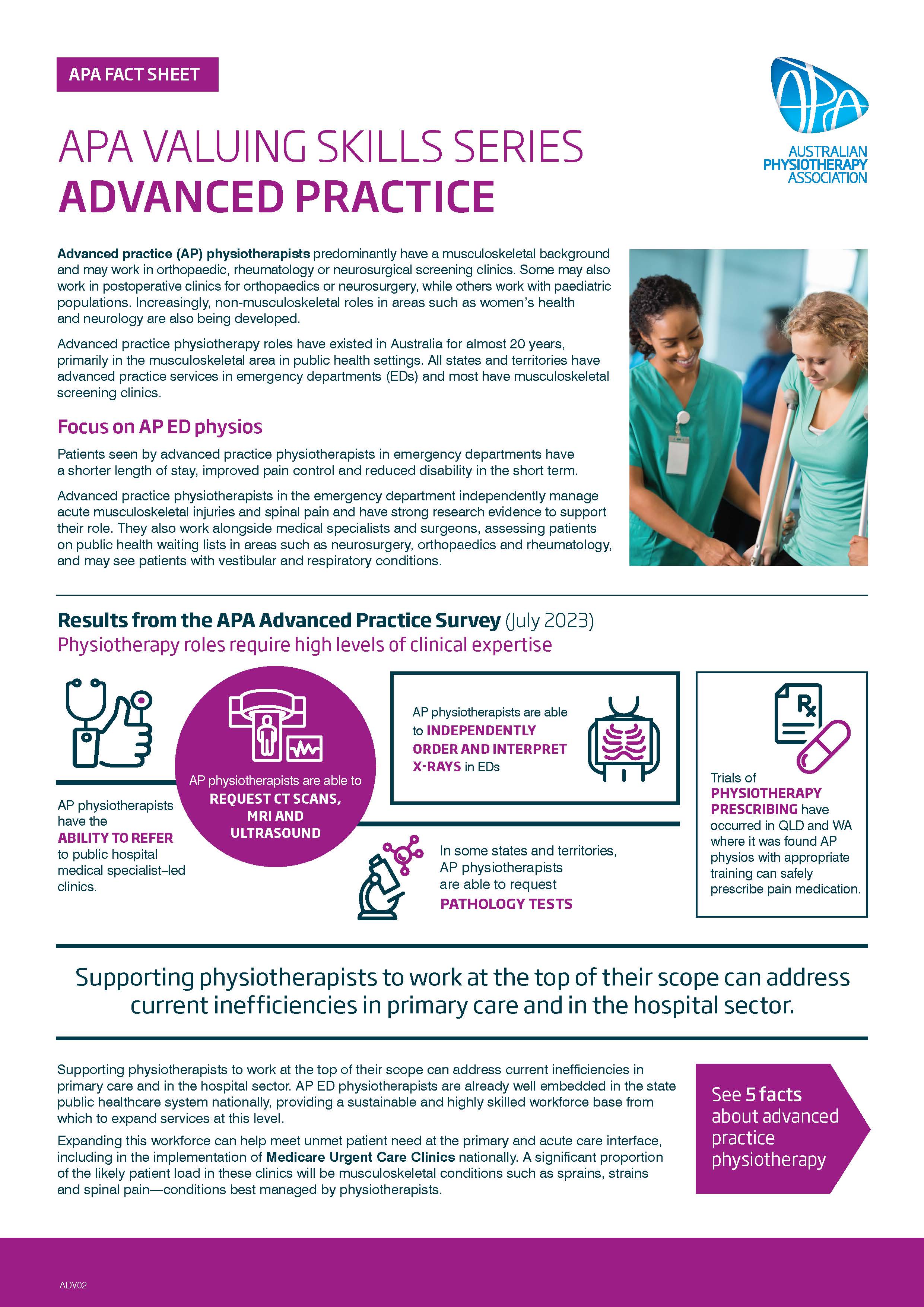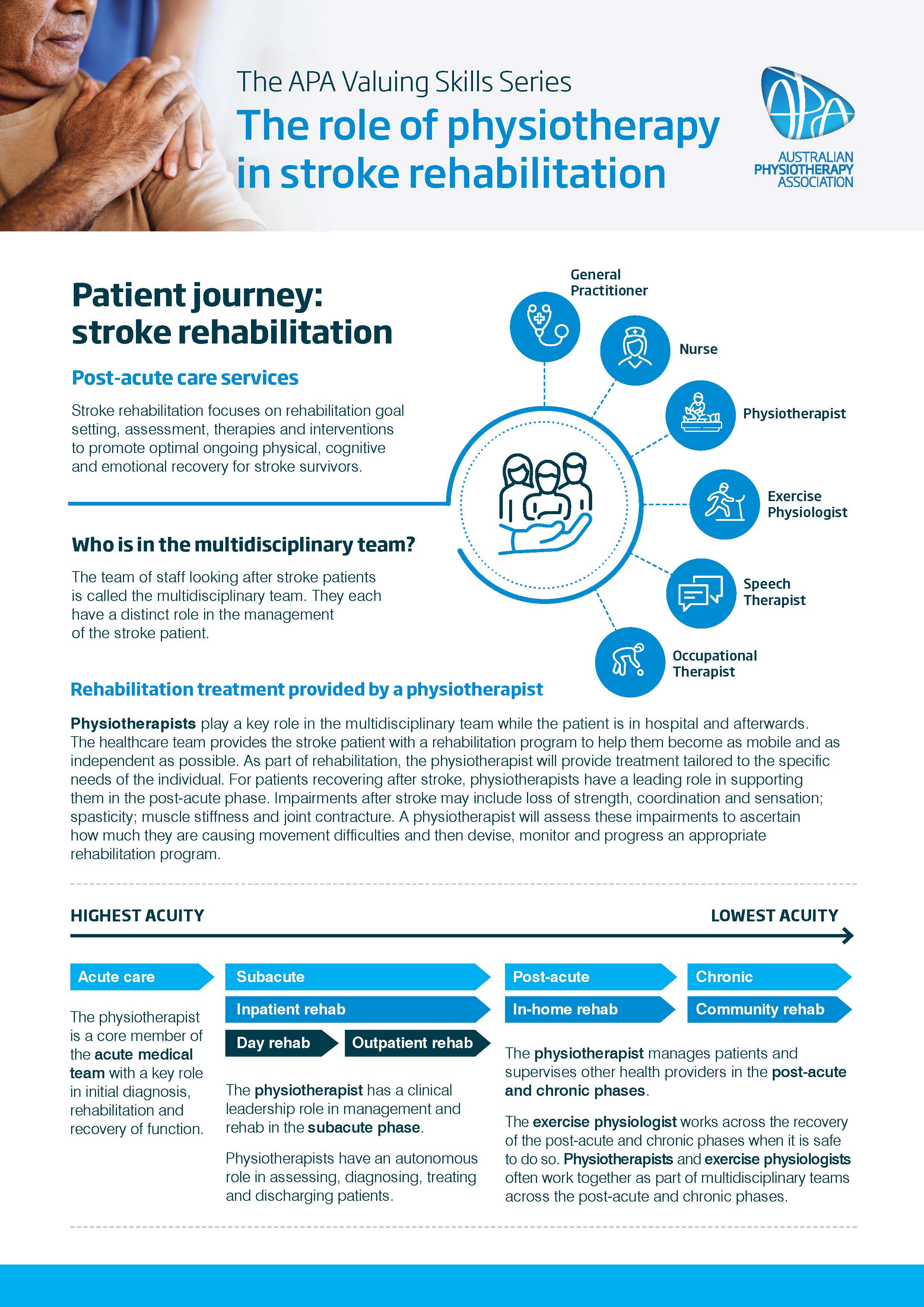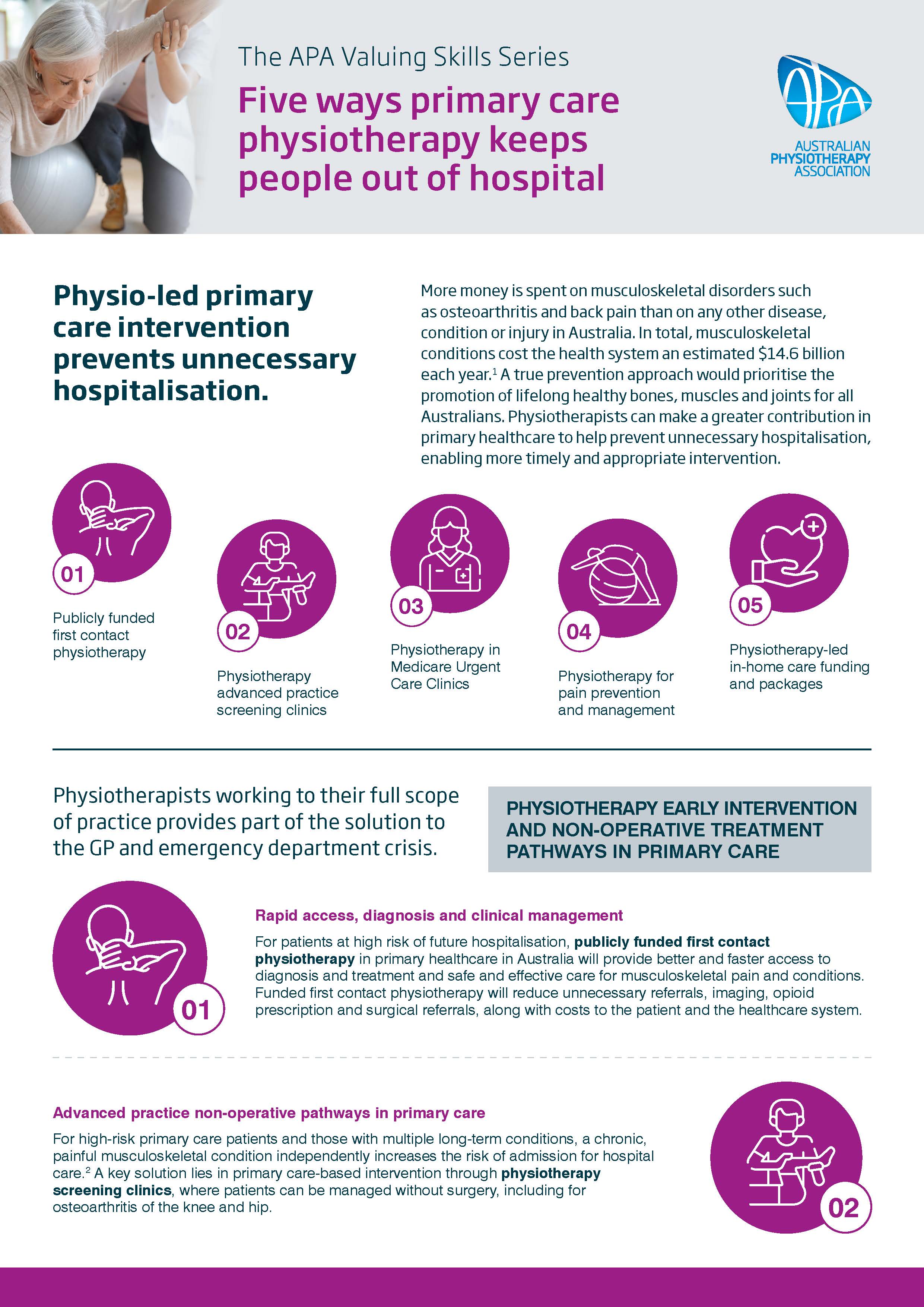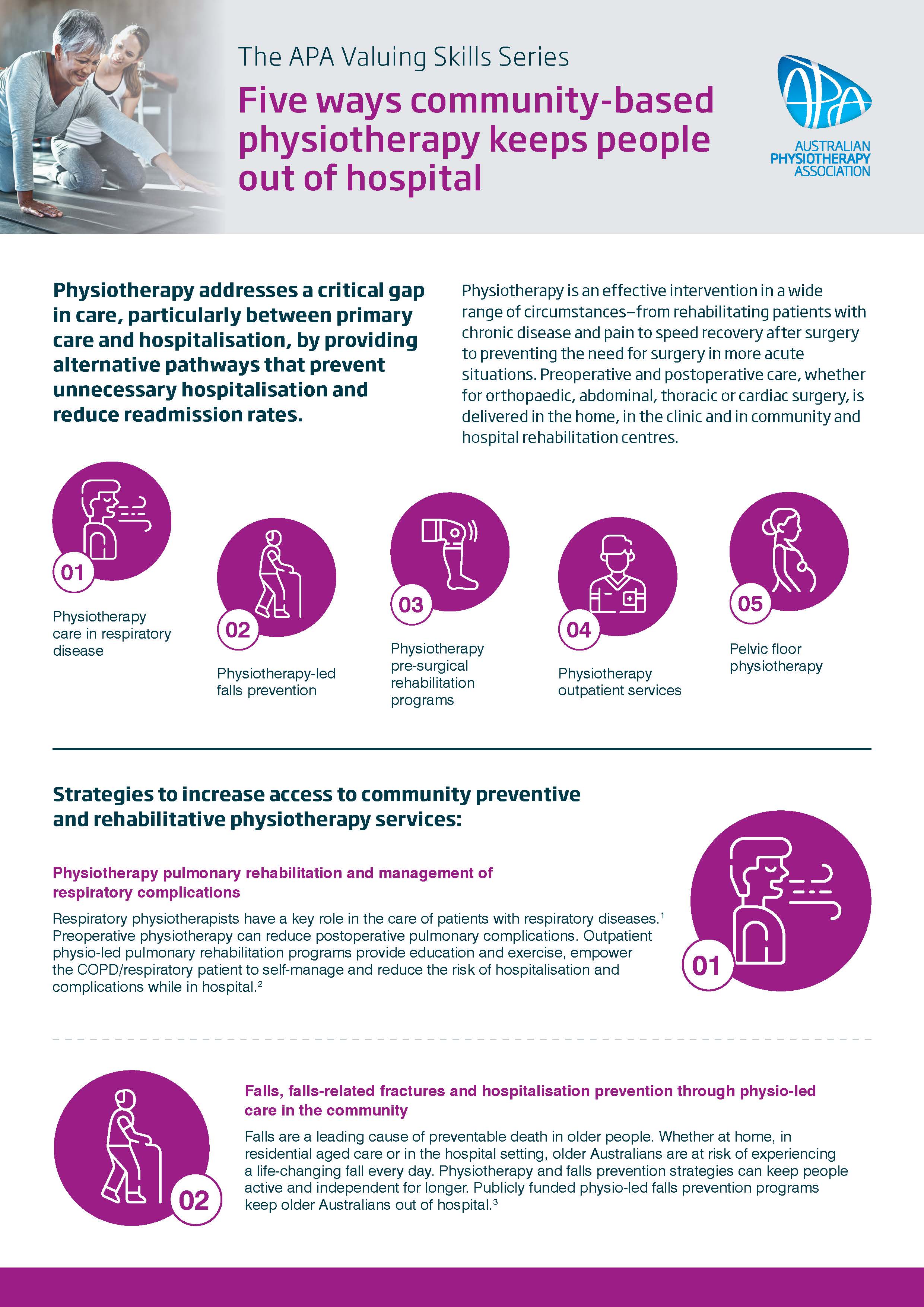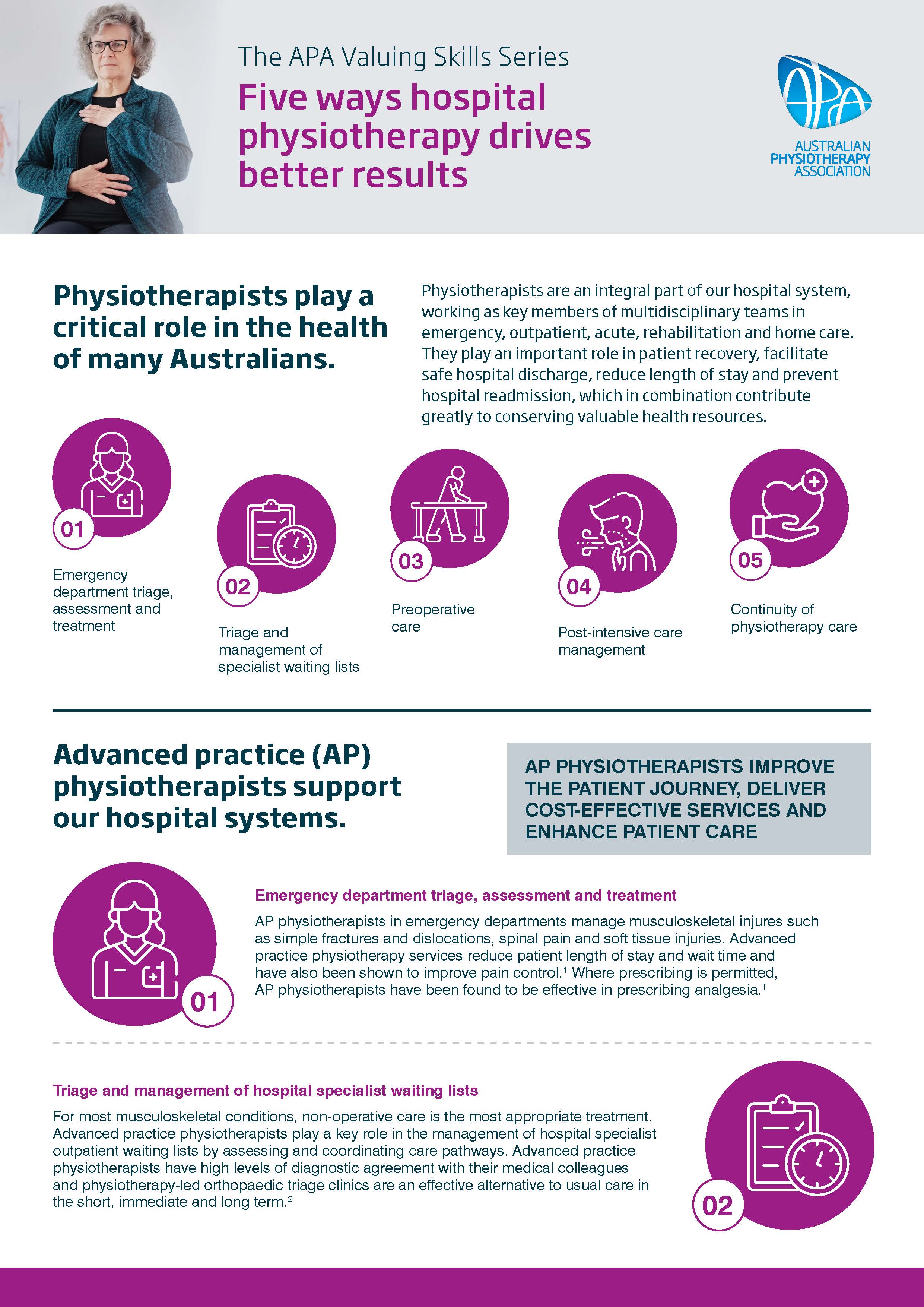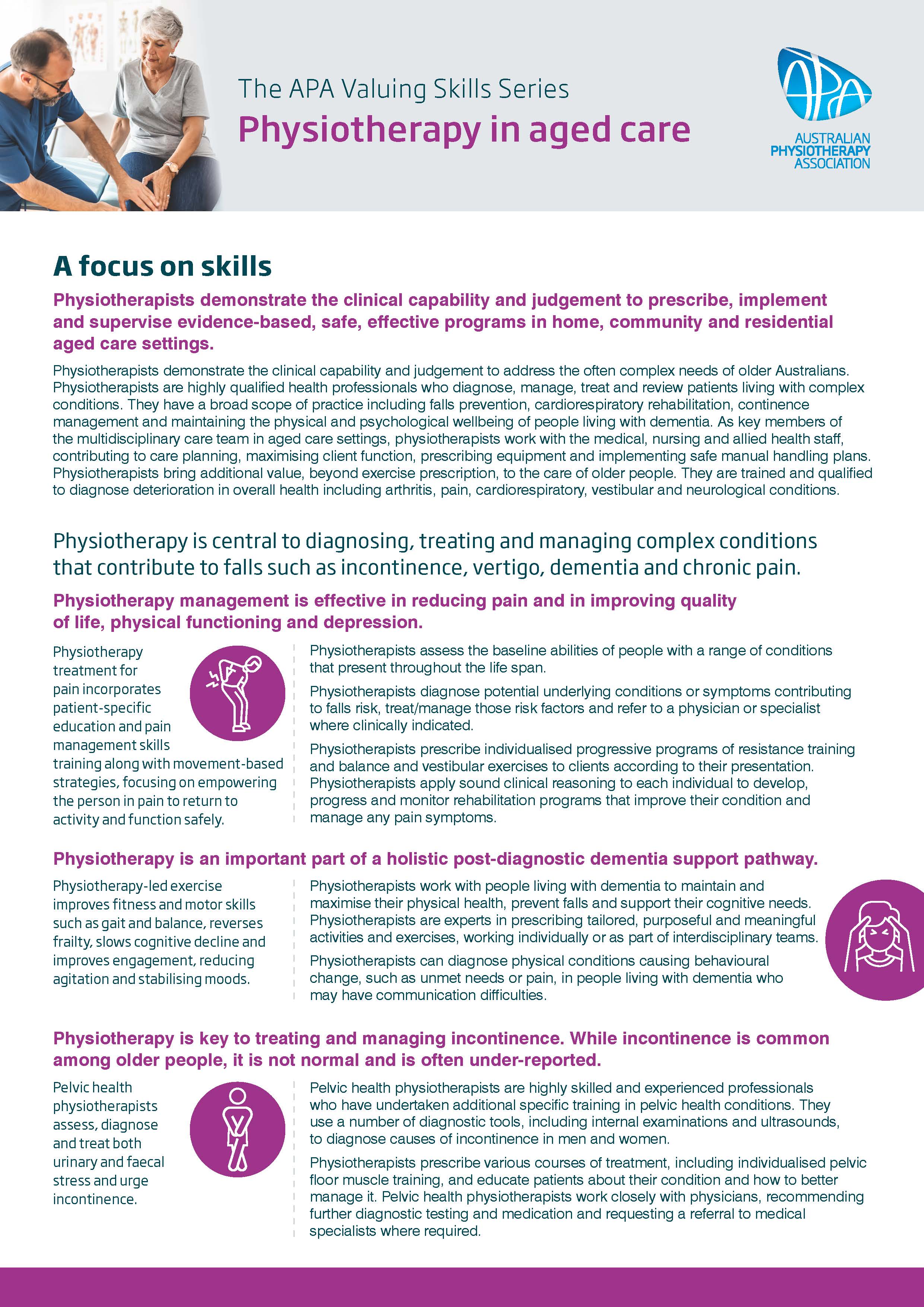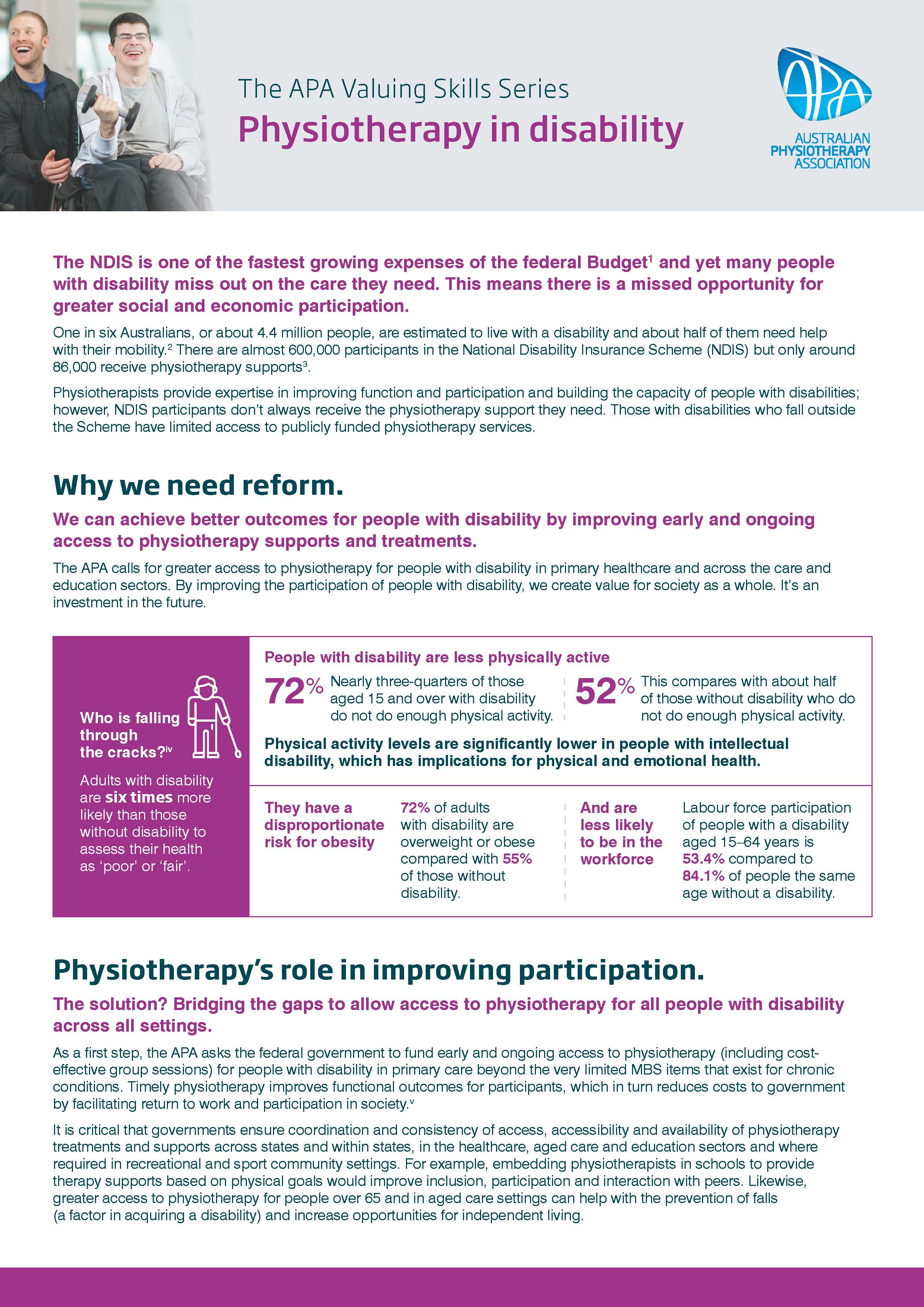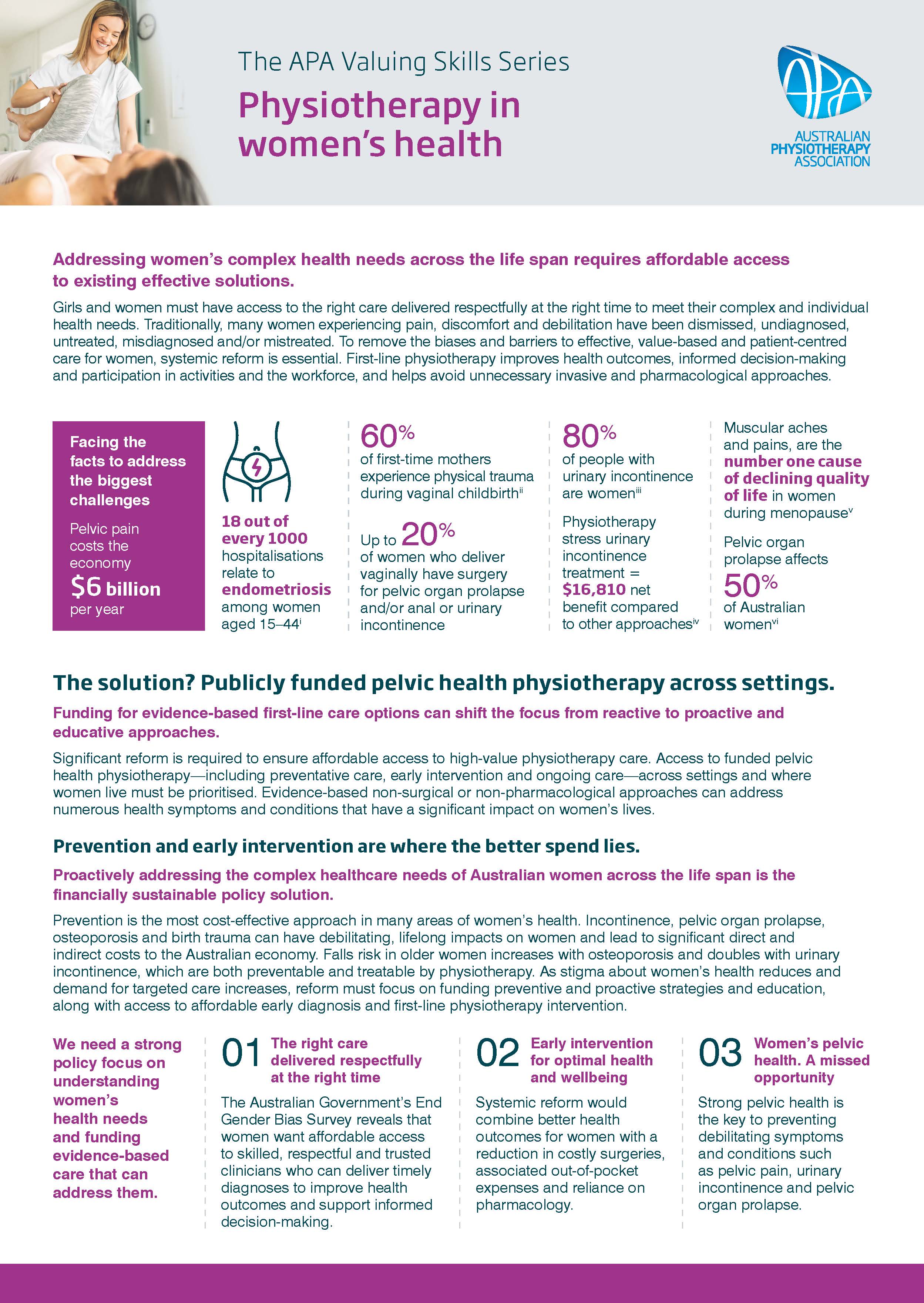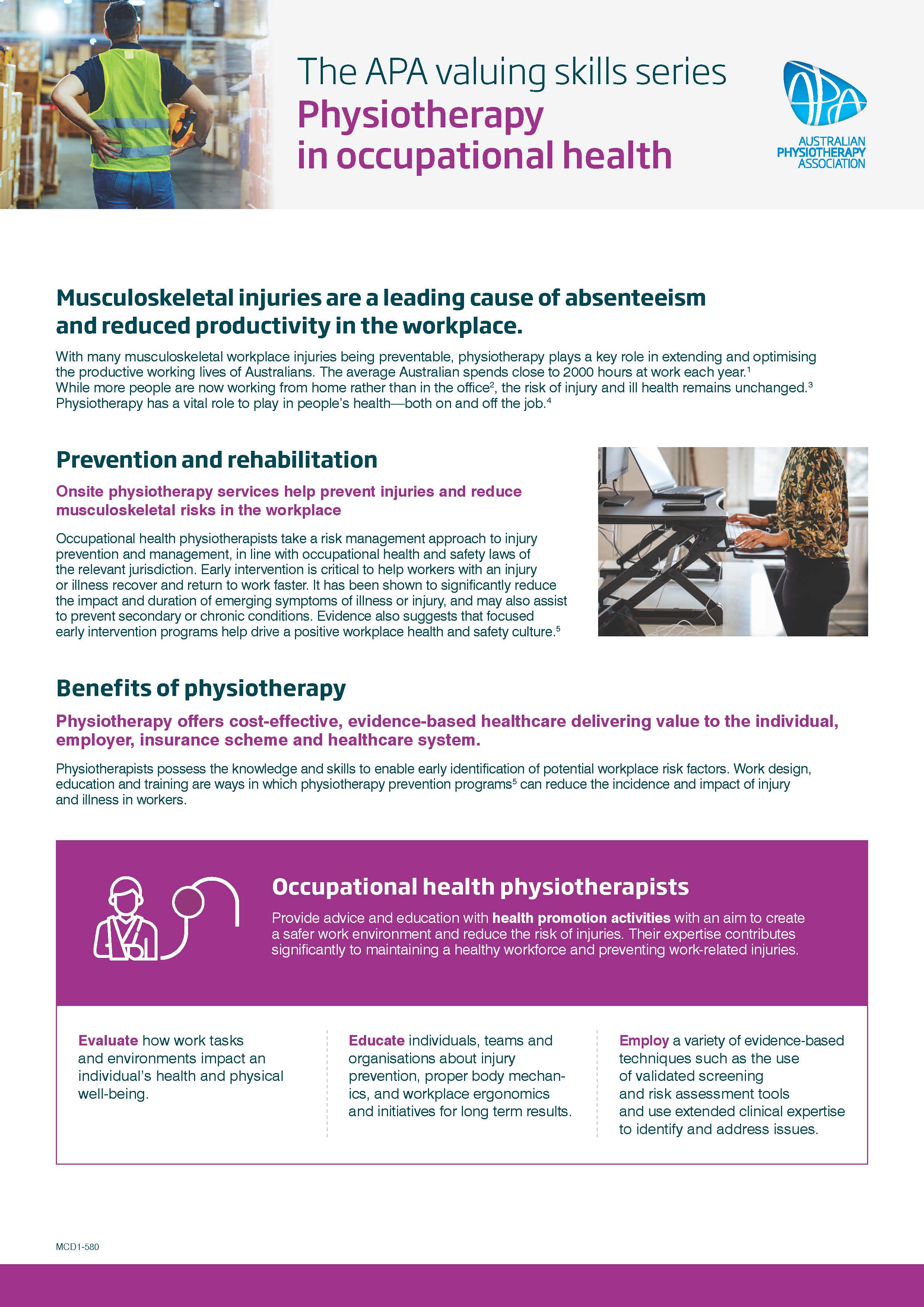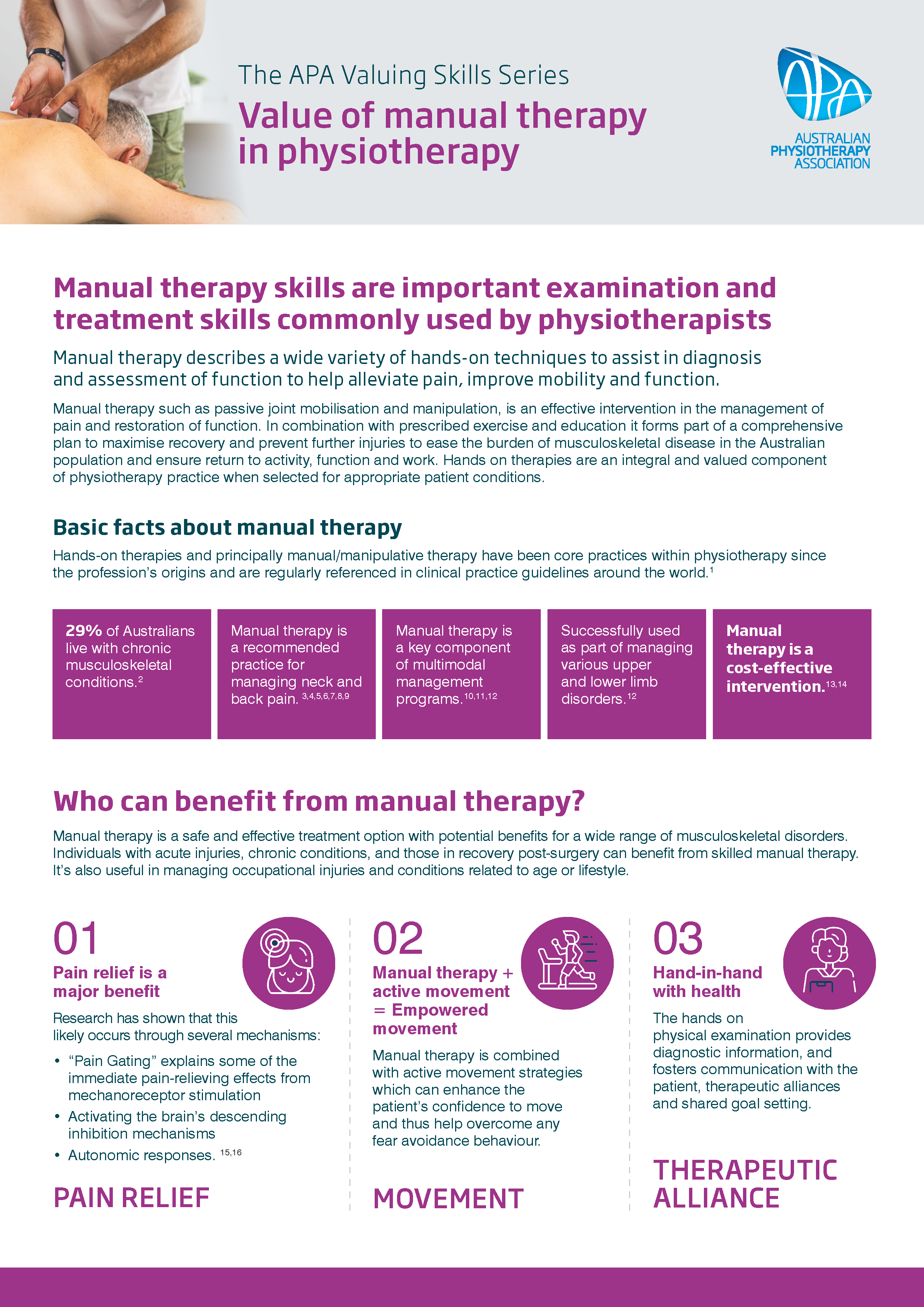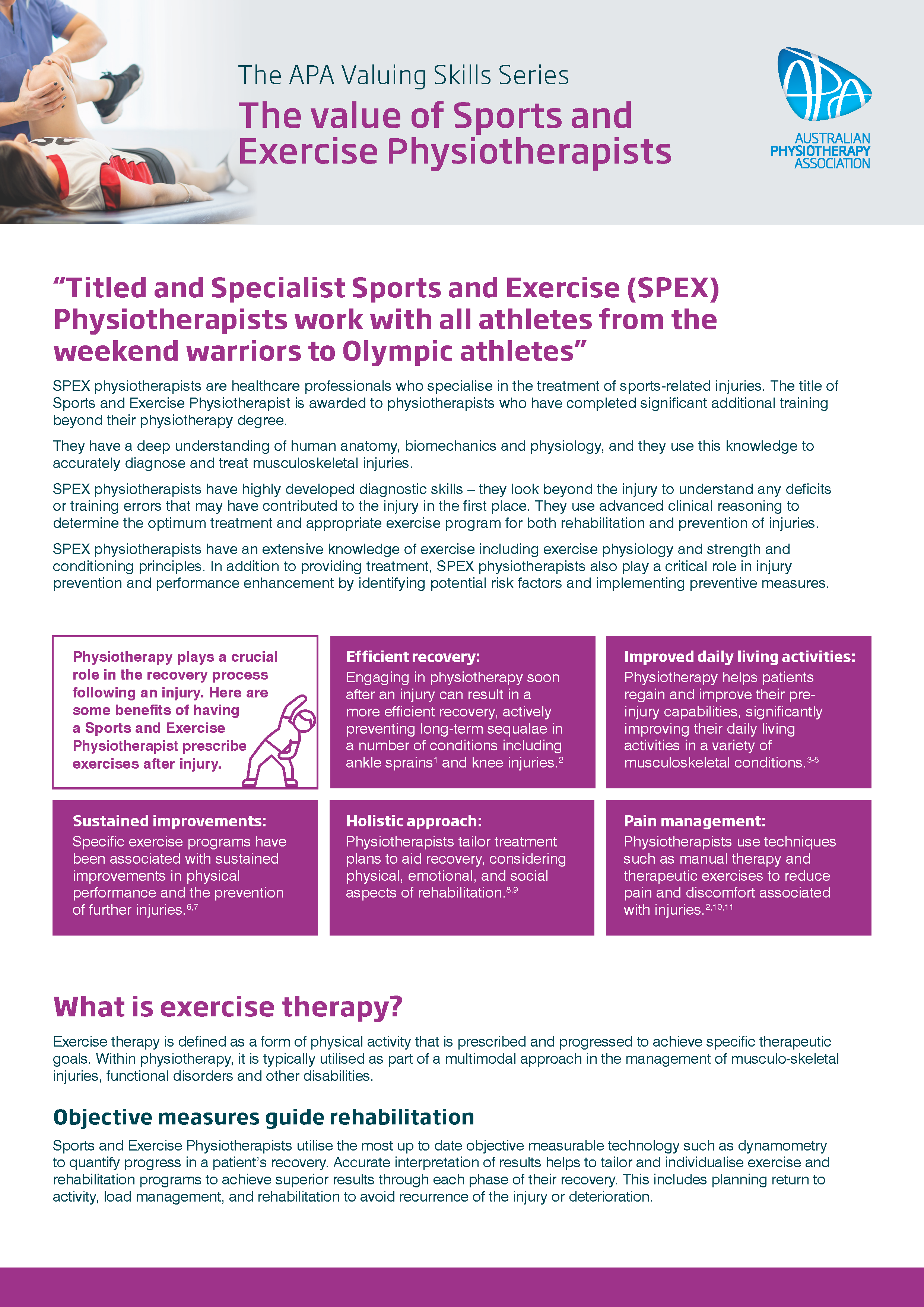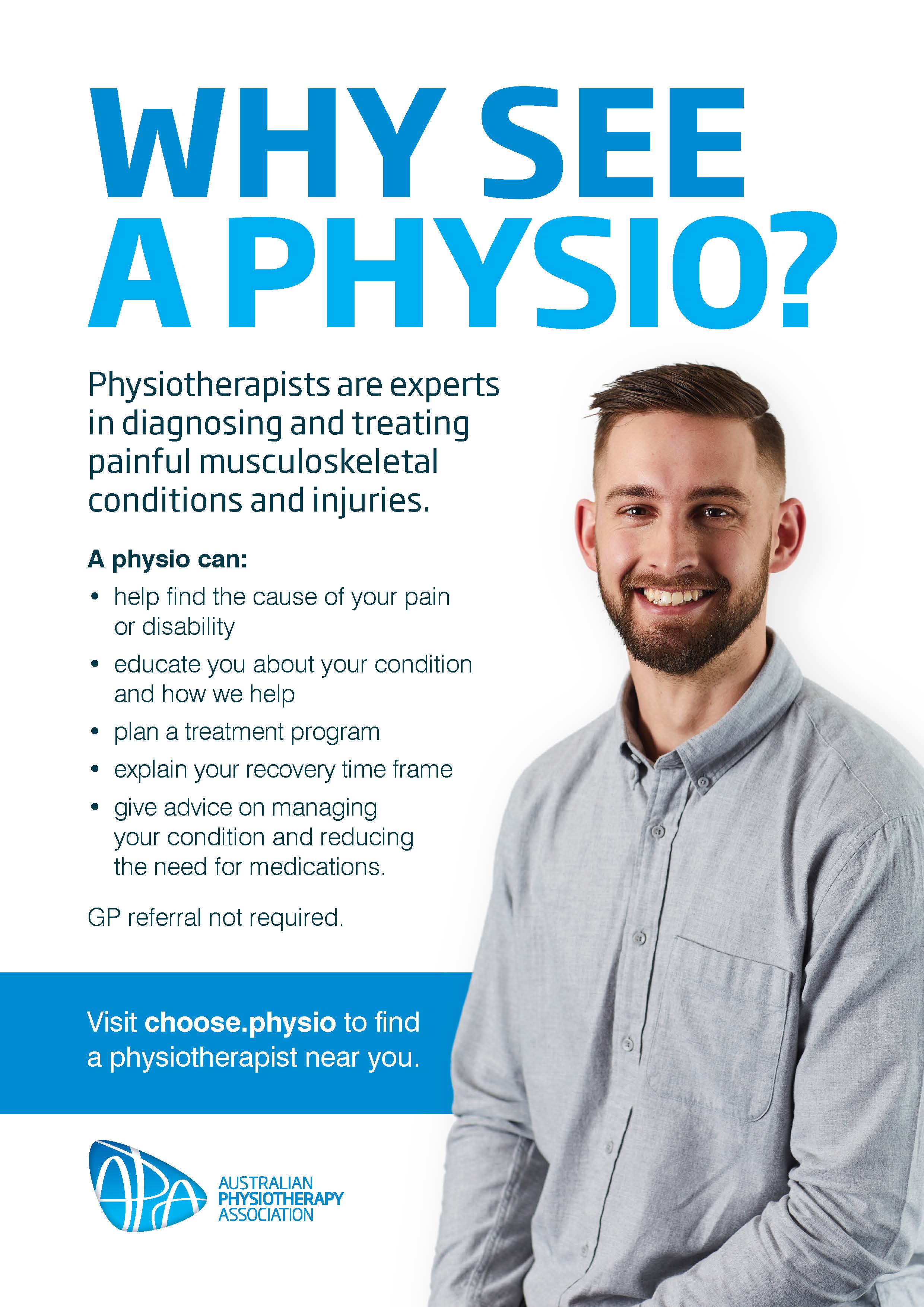The APA Valuing Skills Series
Valuing the skills of physiotherapists now and into the future
Physiotherapists are clinical leaders who work both individually and across multidisciplinary teams. They provide high-quality and evidence-based patient-centred care that can benefit patients, the health system and the population, delivering overall economic benefits.
As pressure increases to limit the growth in overall healthcare costs, it is essential to represent and defend the value provided by physiotherapy services to ensure patients access the right care, in the right place, at the right time, by the right provider.
Our skill value lies firmly in diagnosis, clinical reasoning and the independent regulation of the physiotherapy profession. The effectiveness of our interventions and the value we provide is proven in the research literature. But our discipline scope is broad and funders have told us that they need to know more about our clinical depth.
As part of the APAs advocacy work to optimise the role of physiotherapy in the healthcare system, we are developing a range of documents that are aimed primarily at funders and policy-makers. The information produced is designed to support funders to understand the value and role of physiotherapy in the healthcare system.
This work builds on our other key value documents, including:
- Future of Physiotherapy in Australia: 10-year vision policy white paper, and
- The Economic value of physiotherapy report.
If you are a funder and want to know more, please email the Policy team.
1 | Fact sheets
Physiotherapy services are essential to everyone
The complexity of the current healthcare system, including the federal-state separation, hinders the efficient delivery of care. A shift towards evidence-based preventive care and timely primary care interventions is critical to prevent costly medical procedures and surgeries.
Reform success is reliant on how we strategically prioritise access and outcomes—we see patients unable to access the health care they need, and an over-reliance on traditional primary care practices that are not sufficiently agile to meet demand. Physiotherapy can offer fresh solutions to healthcare reform.
Physiotherapists bring value-based and evidence-based expertise to patients and the health system. As primary contact practitioners, physiotherapists have the expertise to manage the care of patients at various stages of the chronic disease continuum.
The time is now to advocate for ways physiotherapists, working at top of scope, provide a path to better health and wellbeing, and hold some of the most promising models in reorientating the health system towards primary care.
There is significant opportunity within physiotherapy to leverage existing skillsets and scope to address system inefficiencies to the healthcare system. Below we outline physiotherapy-led models to strengthen care and health outcomes, reduce disparities across priority populations, and bring overall efficiencies.
Explore the current fact sheets:
1A. Physiotherapy in pain management
Treating, managing and preventing chronic pain, which affects both physical and mental health, must be a national priority.
Physiotherapy is an effective treatment strategy for acute, chronic and neuropathic pain. As clinical leaders in assessment, prevention, and management of recovery and rehabilitation, physiotherapists work across many areas, including musculoskeletal, neurological, oncological, paediatric and cardiorespiratory practice.
As part of National Pain Week 2024, the APA have developed a Chronic Pain Fact Sheet to provide people living with chronic pain insight into evidence-based recommended pain management.
Physiotherapy is central to the treatment of chronic pain as part of a multidisciplinary approach to pain management. Physiotherapists utilise a broad scope of practice to guide and support people with chronic pain towards a better quality of life; they help get patients moving, which is critical to managing persistent chronic pain.
1B. Advanced practice physiotherapy
Supporting physiotherapists to work at the top of their scope can address current inefficiencies in primary care and in the hospital sector.
Advanced Practice (AP) ED physiotherapists are already well embedded in the state public healthcare system nationally, providing a sustainable and highly skilled workforce base from which to expand services at this level. Expanding this workforce can help meet unmet patient need at the primary and acute care interface, including in the implementation of Medicare Urgent Care Clinics nationally.
A significant proportion of the likely patient load in these clinics will be musculoskeletal conditions such as sprains, strains and spinal pain—conditions best managed by physiotherapists.
1C. Physiotherapy in stroke management
Physiotherapists play a key role in the multidisciplinary team while the patient is in hospital and afterwards.
Physiotherapists have expertise in the area of recovery from stroke. They have advanced knowledge of pathophysiology and restoration of capability in a safe and timely progression of function and they can treat the impairments resulting from stroke. They have skills in the analysis of the contribution of impairments to disability and can form appropriate intervention plans.
For patients recovering after stroke, physiotherapists have a leading role in supporting them in the post-acute phase.
1D. Five ways primary care physiotherapy keeps people out of hospital
To keep people well and out of hospital, and to prevent unnecessary hospitalisation, the APA identifies ways to prioritise physiotherapy-led intervention and non-operative treatment pathways in primary care.
Reform needs to address upstream issues in primary care rather than continue to direct a disproportionate investment in tertiary care. This requires a very different approach and a reform effort that can drive more accessible and affordable care, and one that guarantees the best health outcomes for patients. As a profession, the health benefits and effectiveness of physiotherapy interventions and the value we provide to the healthcare sector is proven—physiotherapy-led primary care intervention prevents unnecessary hospitalisation. Physiotherapists can make a greater contribution in primary healthcare to help prevent unnecessary hospitalisation, enabling more timely and appropriate intervention.
Read the five key ways primary care physiotherapy keeps people out of hospital fact sheet.
1E. Five ways community-based physiotherapy keeps people out of hospital
Continuing our focus on reforms that keep people well and out of hospital, and to prevent unnecessary hospitalisation, the APA identifies ways to prioritise physiotherapy-led care in the community.
Physiotherapy is an effective intervention in a wide range of circumstances—from rehabilitating patients with chronic disease and pain to speed recovery after surgery to preventing the need for surgery in more acute situations. Preoperative and postoperative care, whether for orthopaedic, abdominal, thoracic or cardiac surgery, is delivered in the home, in the clinic and in community and hospital rehabilitation centres.
Read the five ways community-based physiotherapy keeps people out of hospital fact sheet.
1F. Five ways hospital physiotherapy drives better results
Physiotherapists are an integral part of our hospital system, working as key members of multidisciplinary teams in emergency, outpatient, acute, rehabilitation and home care.
They play an important role in patient recovery, facilitate safe hospital discharge, reduce length of stay and prevent hospital readmission, which in combination contribute greatly to conserving valuable health resources.
Read the five ways hospital physiotherapy drives better results fact sheet.
1G. Physiotherapy in aged care
Physiotherapists play an important role within aged care in helping older Australians maintain their mobility, strength and independence and are critical to improving function and mobility through preventing falls.
Reform needs to prioritise funding cost-effective care for optimal health, with a focus on prevention, early intervention and rehabilitation to enable people to live and stay well for longer with a reduced need for care and support. Physiotherapy offers solutions that will strengthen care and lead to cost efficiencies.
Read the:
1H. Physiotherapy in disability
Ensuring that people with disabilities achieve the highest level of function, independence and mobility possible must be a national priority.
The NDIS is one of the fastest growing expenses of the federal Budget and yet many people with disability miss out on the care they need. This means there is a missed opportunity for greater social and economic participation. For Australians with disability, access to physiotherapy services means access to clinicians who are highly skilled in the diagnosis, assessment and treatment of motor impairments and movement disorders, including the sensory, musculoskeletal and neurological contributors. Physiotherapists can improve movement and function, treat and reduce pain, and increase participation in social and economic life, including by assisting with return-to-work capability.
1I. Physiotherapy in women's health
Advanced practice pelvic health physiotherapists are uniquely qualified to support women through all stages of life, including the prenatal and postnatal periods, perimenopause/menopause and ageing.
Pelvic health physiotherapists deliver effective first-line treatment for the symptoms most commonly reported by women as impacting their quality of life, social and workforce participation and mental health – including birth trauma, perimenopause and menopause, endometriosis and pelvic pain, pelvic organ prolapse and stress urinary incontinence. They diagnose causes of symptoms, take a holistic and educative approach not only treating symptoms but giving women confidence to reach their health goals, and use a range of evidence-based interventions to address the causes of pain.
1J. Physiotherapy in occupational health
The economic burden of work-related musculoskeletal disorders is substantial, with wide-ranging effects on individuals and society. Occupational health physiotherapists play a crucial role in maintaining a healthy and fit workforce by adopting a comprehensive approach that considers all aspects of an individual’s work.
Preventing workplace injuries and intervening early is vital for both employers and employees. Engaging the expertise of an occupational health physiotherapist can help businesses create a culture of safety and awareness, promote a healthier work environment, reduce workers' compensation claims and enhance employee well-being.
1K. Value of manual therapy in physiotherapy
Manual therapy in the form of hands on passive joint mobilisation and manipulation of joints, is an effective intervention in the management of musculo-skeletal pain and restoration of function.
The main aim of this fact sheet is to provide a comprehensive understanding of what manual skills entail and what manual therapy is, its diverse applications, and how it enhances the patient’s care and recovery journey.
Manual therapy is a part of a complex clinical reasoning process and involves constant reassessment of effectiveness for the patient and needs regular review to reassess the treatment plans and choice of (evidence-based) manual therapy skills. It is always part of a multimodal management program.
Read the Value of manual therapy in physiotherapy fact sheet
1L. Value of sports and exercise physiotherapists
Sports and exercise (SPEX) physiotherapists provide professional advice on how to avoid sports injuries, treat injuries and help recovery for those playing recreational sport right through to elite sport.
Beyond diagnosing and treating injuries, SPEX physiotherapists are well-versed in exercise physiology and are recognised for their skills in appropriate clinical and rehabilitative exercise prescription. This knowledge empowers them to evaluate injuries and tailor a personalised recovery and rehabilitation plan from injury to return to physical activity.
SPEX physiotherapists work as part of a dedicated multidisciplinary team to support all athletes to recover, manage injury and return to peak performance and confidence in safe participation in sport and activity.
Read the value of sports and exercise physiotherapists fact sheet
2 | Unleashing the Potential of our Health Workforce
Scope of Practice Review
The Government announced the Unleashing the Potential of our Health Workforce (Scope of Practice Review) in the 2023-24 Federal Budget, as part of their response to the Strengthening Medicare Reform Taskforce.
A priority recommendation from the Taskforce Report was that the Australian Government work together with the states to explore the barriers and opportunities for health practitioners to work to their full scope of practice. This welcome recommendation poses both great opportunities and some challenges to our profession.
Physiotherapists, as primary contact practitioners, have the expertise to manage the care of patients at various stages of the chronic disease continuum. There is significant opportunity within physiotherapy to leverage existing skillsets and scope to address system inefficiencies in primary care.
Unleashing the full potential of physiotherapists, by enabling them to work to the full extent of their education and training, will help to address this significant musculoskeletal burden on the health system. This will drive better health outcomes, improve the utilisation of our healthcare resources and help overcome the inefficiencies in primary care and the hospital sector.
3 | Scope matters
Role definition and scope of physiotherapy is becoming increasingly important.
Together, we have a key role to advance and protect our core discipline scope, to ensure we have a clear value narrative to optimise the role of physiotherapy in the health system. At the heart of the issue is valuing skills and clarifying our value against other healthcare disciplines (scope) particularly in the compensable arenas.
The objective of our valuing skills campaign is to ensure funders fully understand the value physiotherapists bring when compared to other disciplines. This is our value or skill differential and lies firmly in diagnosis, clinical reasoning, manual therapy and handling skills, and the independent regulation of the physiotherapy profession.
4 | Campaigns – APA member only
APA members are invited to use campaign materials and join in highlighting the value of our profession.
Campaign 1 | Streamlining GP referrals
Working together to get the best outcome for the patient.
As a first point of entry into the healthcare system, referral decisions are almost entirely controlled by general practitioners (GPs)—they are key to facilitating patient access to other health professionals.

